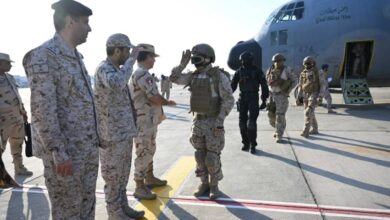Two days ago, the foreign affairs minister spoke about Egypt’s sovereignty and the security of its borders. The minister did not mention the separation wall which Egypt has begun erecting along its border with the Gaza Strip. As I write these lines, I haven’t yet heard a single declaration on this issue–at a time when the regime boasts about its free media and readily-available information about anything and everything.
We have spokespeople for the presidency, the cabinet and the Ministry of Foreign Affairs. But none of them have said anything to us about that separation wall. Neither have any of the dozens of official television and radio stations or government papers reported the story. In fact, we first learnt about it from Israeli daily Haaretz one week ago. Then, different international news agencies picked up on the news, which was finally confirmed by the US deputy assistant secretary of state, who shunted responsibility for the wall onto Egypt. Yet officials in Egypt remained stubbornly silent.
There are only two explanations for the silence. Either the government is keenly aware that the separation wall won’t be well-received by the public, so it wants to hush the news up–which makes it a cowardly government; or it simply doesn’t care about the opinion of the public, be it the Egyptian, Palestinian or Arab public–which makes it an arrogant government.
A third explanation remains. Possibly, the government, like the governments of underdeveloped countries generally, believes that the news won’t spread if it doesn’t announce it–and that makes it a stupid government.
Anyway, state-run media has, for ages, been covering up the news rather than covering it. Only one limited-circulation government paper reported the story–but did so in a way that was rather economical with the truth.
Details of the wall–its length, height and the materials used to build it–have been reported by different radio stations and papers all over the world. This huge steel barrier, which is costing the US millions of dollars, is being built under the supervision of the US Army Corps of Engineers and with the use of American equipment.
It is thus an American wall being built on Egyptian land. Egypt either agreed to this, or was forced to have the wall erected on its land. The US is protecting Israel as it has always done, and as it continued to do after the Israeli assault on Gaza last January.
Before George W. Bush left office, the US concluded a security agreement with Israel which called for the adoption of certain measures to stem the smuggling of weapons and goods from Egypt to Gaza. Although it is said that Egypt refused to become party to the agreement, it remained closely involved with the meetings in Copenhagen and London that discussed implementation of certain steps of the agreement on Egyptian land.
The reason behind building the wall is therefore clear. It tightens the blockade on the Gaza Strip from the south, as Israel besieges the strip from the north, east and west. The goal, as described by Karen Abu Zayd, recently retired commissioner-general for the United Nations Relief and Works Agency for Palestine Refugees in the Near East (UNWRA), is to prepare for an Israeli attack on Gaza.
Whether such an attack is launched or not, the barrier will, according to Abu Zayd, make life harder for the Palestinians in Gaza–who have had no window to the world except for the Rafah border since Israel hermetically sealed Gaza’s six other crossings.
Abu Zayd’s statements led to a counter campaign in which a US army reserve colonel called for "sanctioning the American administration and the governments of Egypt and Israel for being largely responsible for the continuous inhumane treatment of the people of Gaza and for violating the human rights of the Palestinians."
Opposition members of the People’s Assembly are expressing their objection to the building of the wall, which they consider a crime against the people of Gaza. It’s Egypt’s biggest crime of the year. Earlier in the year, for 22 days, the duration of the Israeli assault on Gaza back in January, Egypt remained disgracefully silent as 1440 Palestinians were killed, 5000 injured and 50,000 others were uprooted. Then it remained resolutely silent as Israeli warplanes dropped bombs on our borders to destroy smuggling tunnels, damaging a number of Egyptian homes in the process.
In the period since then, Egypt has kept the border tightly sealed, barely permitting international and Egyptian aid convoys to enter the Gaza Strip or Palestinians to leave it.
Now, in cooperation with Israel and the US, Egypt has begun to build a wall that will stifle the Gazan economy and starve 1.5 million Palestinians, forcing them to either succumb to the will of Israel or direct their anger against Hamas to make way for the corrupt Abu Mazen. Now that’s a crime, regardless of whether or not we approve of Hamas.
Since the Israeli assault, Egyptian official media has been caught up in a frenzy, asserting that Egypt alone has already paid dearly for the ungrateful Palestinians. The media campaign became all the more intense as the assault on Gaza intensified. Palestinians fled to the borders only to find Egypt’s doors closed in their faces. When they later sought refuge in the Sinai Peninsula, Egyptian officials wailed that Egypt’s sovereignty had been violated, that Egypt’s national security was in danger, and that the Palestinians had come to "settle in Sinai."
The campaign is about to begin again. This is the third crisis for the Egyptian regime in one month–three intensive media campaigns in just four weeks. The first was the campaign against Algeria, the second against ElBaradei–and in both cases the Egyptian regime failed miserably. And now here comes the third one–a campaign in which the Egyptian regime will certainly fail again too.
I’m certain about the regime’s failure, because the new campaign will assert that the separation wall in fact "protects" the Palestinians–even though the Palestinians haven’t asked for protection. It will suggest that the Palestinians should not be allowed to sneak into Egypt without official permission, which would sound reasonable if it weren’t for the fact that the Israelis are already roaming around Sinai without visas, and that there’s an Israeli scheme to expel the Palestinians from Israel so they might finally settle in Egypt.
The truth is that Egypt fears it will be sanctioned if it doesn’t help cordon off Gaza and stop the smuggling of weapons via underground tunnels.
Egypt could have addressed the roots of the problem: the occupation and blockade. Egypt could have worked with other countries to end the crisis, allowing the passage of people and goods legally and freely–as is the case with Egypt’s other border crossings. Instead of putting up a wall to satisfy Israel and the US, Egypt could have called for amending the articles of its peace agreement with Israel to permit the Egyptian army to maintain a larger presence in Sinai, since the army alone is capable of stopping smuggling activities.
But Egypt did not want to disappoint Israel. Along with other moderate Arab countries, Egypt has made shameful deals with the Israelis, some clandestine and some declared, the most recent of which is the agreement to build this separation wall, which officials are attempting to justify as a means of safeguarding Egypt’s "national security."
But what kind of security can be guaranteed by siding with Israel?
What security are we talking about if Egypt, according to the Associated Press, has given up its traditional leadership role when it comes to problems in Palestine? What security are we talking about if Egypt is losing its importance as a mediator between Palestinians by being biased towards one side? What security are we talking about if we’re giving our borders up to the Americans? What security are we talking about without the Arabs, with whom our history, culture, identity and geography binds us?
Which of the following safeguards Egypt’s security: lifting the blockade, or tightening it? Does Egypt remember how its stance during the assault on Gaza tarnished its reputation and diminished its leadership? Does Egypt recall how demonstrators took to the streets and surrounded its embassies the world over? Does Egypt remember how the Lebanese besieged its embassy and pelted it with stones?
Tomorrow, the Lebanese will protest again, and then our officials will crawl out of their holes and launch a hysterical attack that will stir up an anger that Egypt won’t be able to contain. Then, we will wonder, as we did after the match against Algeria, "Why do Arabs hate us?"
We tend to willingly forget that the Arabs, especially their political elites, know things about Egypt that some Egyptians don’t. They know that when Egypt went to war against Israel, it wasn’t doing so for the sake of the Palestinians as much as it was defending its eastern borders. They know that Egypt was responsible for Gaza according to the armistice agreement signed in 1949, and that Egypt had administrative authority over Gaza until it lost the strip in the 1967 war, along with other lands.
Arabs also recall that most Arab countries severed relations with Egypt when the latter signed a peace agreement with Israel. It perplexes them that every day Egypt opens its doors to the leaders of Israel. Its arrogant prime minister was even invited to a breakfast banquet last Ramadan hosted by President Mubarak in Sharm el-Sheikh. Arabs know quite well that Egypt didn’t file any lawsuits against Israel–a state that killed its prisoners of war–whereas a London court issued an arrest warrant against former Israeli Foreign Minister Tzipi Livni for her role in the Israeli assault on Gaza.
Arabs know that several foreign countries are boycotting products from Israeli settlements–products that Egypt welcomes with open arms. Arabs know that academics in other countries have cut off relations with Israel, while the Bibliotheca Alexandrina welcomes Israeli visitors. They know that we supply Israel with discounted natural gas–and even plan to supply more of it in July–at a time when other Arab countries need it at normal retail prices. In fact, Egypt needs its natural gas more than any other country.
After all that, we still ask: "Why do they hate us?" The truth is that Arabs don’t hate Egypt–they hate its regime and official media. I’ve known them for 50 years and toured their countries all the way from Tangiers to Muscat, and all I have seen was love for Egyptians and Egypt, to which they’ve been flocking–for tourism, trade, and education–for decades. Egypt was their destination of choice both during the royal era and after the revolution.
Today, everything has changed. The Arabs of the 1950s are different from those of the 21st century. The Arabs of today have states and kingdoms with well-established institutions. They have oil and untold wealth, universities better than ours and medical centers that tower over our decrepit hospitals. They have high-caliber cadres of physicians, engineers and scientists. They are progressing, while we are regressing.
With the advent of globalization, many of the Arab tourists who used to come to Egypt are instead dazzled by the lights of Dubai, the hustle and bustle of Lebanon, the beaches of Tunisia, the whiff of history permeating the resorts of Morocco, America’s Orlando, South Africa and Thailand. Egypt’s primary attraction has always been its monuments, which never really tempted its Arab visitors as much as Egypt’s way of life.
Indeed, Egypt is still tempting to Arabs, but not as much as before. Egypt no longer offers low prices. Besides, the phenomena of violence, pollution and begging are a turn-off to tourists. Egypt discourages investors and traders due to its complicated administrative procedures, corruption and bribery. It drives away students and patients who don’t find the education or medical services they wish for.
Arabs and Egyptians alike have changed. Egypt, which called for the Arab League to be established during the time of King Farouk, has abandoned the Arabs since the 1970s and has instead set its eyes set on Washington, believing that the US controls its future. Likewise, at times of crisis, it inevitably bows to Israeli pressure.
Before another silly media campaign is launched, then, the wise among us should think hard–because, this time, our problem will be with the entire Arab nation.
And we must halt the building of this shameful wall!
Translated from the Arabic Edition.




